Watermelons are those luscious red fruits that quench our thirst in summer. Often I find myself wandering can guinea pigs eat watermelon too? Will it be a thirst-quencher for them also just like us. So, I researched and fed it to my guinea pigs, and here is what I have learned.
Guinea pigs can eat watermelon but only in moderation. Since too much watermelon can cause digestive problems, it’s best to offer a small amount. We can feed watermelon and its rind, but make sure you remove all the seed as it can lead to choking.
Guinea pigs are easy to take care which makes them a favorite pet. But they do need a well-balanced diet to stay healthy and happy.
We must provide them with adequate nutrition so they can live a healthy life.
Fruits, too, are an integral part of their diet. They are often considered as a treat or supplement by many people, which is an understatement.
They play an essential role in fulfilling the vitamin needs in their diet. So, we must try to create a well-balanced diet in which we can serve them every day.
I shall discuss the benefits, hazards, serving size, and much more in this article, so make sure you stick with us till the end.
Nutrition in watermelon?
Source:USDA National Nutrient data base
| Vitamin C | 8.1 mg/ 100 g |
| Vitamin A | 569 IU |
| Calcium | 7 mg/ 100 g |
| Phosphorous | 11 mg/ 100 g |
| Potassium | 112 mg/ 100 g |
| Fiber | 0.4 g/ 100 g |
| Sugar | 6.2 g/ 100 g |
| Protein | 0.61 g/ 100 g |
| Carbs | 7.55 g/ 100 g |
| Calories | 30 Kcal |
| Fat | 0.15 g/ 100 g |
| Water | 91.45 g/ 100 g |
Watermelon contains a moderate amount of Vitamin C in it. It is also rich in other vital nutrients like Vitamin A, Potassium, which is helpful for the body.
Vitamin C and vitamin A help strengthen the immune system, develop body tissues, and fight diseases in the body.
Watermelon does contain a trace amount of Calcium and phosphorous in it.
Calcium and Phosphorous are also an aspect needed for proper bone growth, teeth development, and other nervous system needs.
Watermelon also contains the right amount of potassium in it.
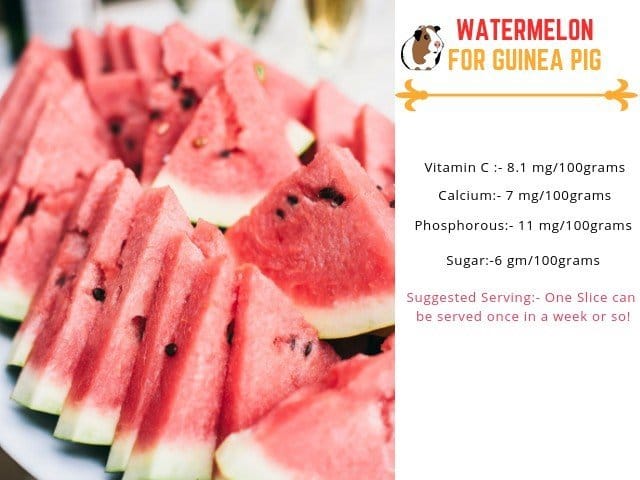
Potassium is an essential aspect of the body as it helps in regulating fluid balance in the body. It also helps in muscle development and preventing kidney and bladder stones.
Is watermelon good for Guinea pigs?
Yes, watermelon is an excellent addition to our guinea pig’s diet, especially in summers. Watermelon helps to keep the body of our Guinea pigs hydrated in the summer.
Watermelons contain Vitamin C, which helps to prevent diseases like scurvy in Guinea pigs.
Scurvy is one of the most common disease diagnosed in guinea pigs. As guinea pigs cannot produce their own vitamins, their diet needs a supplement with food rich in vitamin C and Vitamin A.
Although too much calcium is terrible for the Guinea pig’s diet, the amount of calcium is watermelon is quite adequate.
Calcium is also needed in young guinea pigs more as their body and bones are developing. Pregnant guinea pigs also need to be served with a slightly higher calcium diet. It helps in improving the teeth and bones of young ones.
Watermelon also contains an abundance of potassium in it. Potassium is an excellent nutrient as it helps prevent stones in Guinea pigs, which is a common issue seen in guinea pigs.
Learn about more great fruits that your Guinea pig can eat:
Pears, Apple, Bananas, Mango
Is Watermelon bad for Guinea pigs?
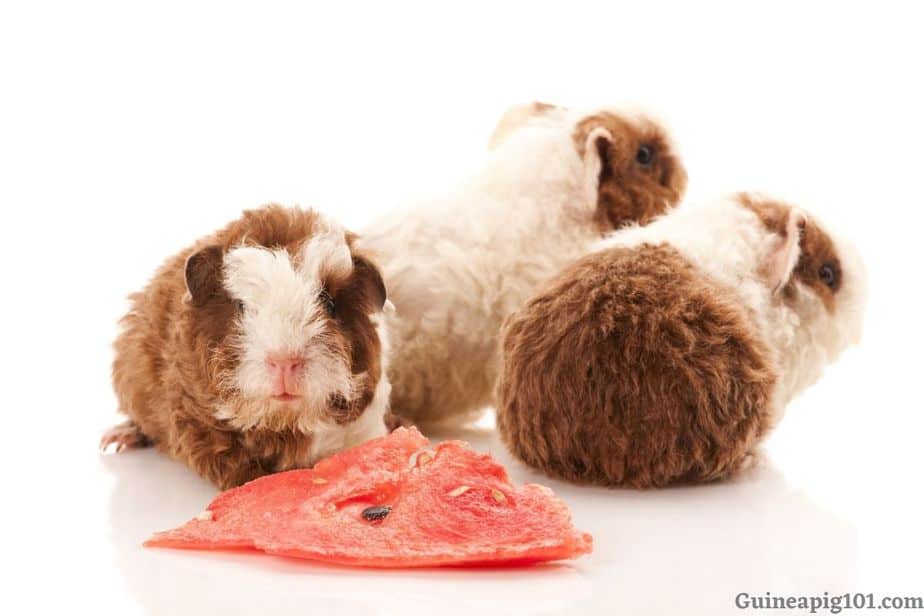
Anything in excess is bad.
Anything in excess would be harmful, and the same applies to watermelon too. Although Watermelons include many goodies in the form of vitamins and antioxidants, it does have some downside to it.
Guinea pigs often suffer from diarrhea when they consume more than the suggested quantity of watermelon.
Watermelon does contain a trace amount of fiber, which can cause diarrhea if served in much quantity.
Watermelon also contains a significant amount of sugar. 6 gram/100 grams of sugar might not seem like much to you, but it’s a great deal for your guinea pigs.
Guinea pigs are often sweet-toothed, as I believe. They will munch on anything sweet, and those scenarios are fun to watch when your guinea pig is popcorning for a treat. But that doesn’t mean we can serve them a lot of it.
The high sugar content does possess a threat to diseases like diabetes and obesity in Guinea pigs.
We must try to use watermelon and other fruit just like a small portion of the diet to supplement vitamins and not make it a significant chunk in the menu.
A Quick tip: You might be tempted to toss a watermelon just out of your refrigerator to your guinea pig. But it might be bad for their digestive health. Let the watermelon sit in room temperature before serving it to your guinea pigs.
How often can they eat watermelon?
Guinea pigs can eat watermelon regularly until and unless you keep the quantity in check.
The typical serving would be once a week or so, but if served in quite a small amount you can help for more than 2-3 times a week also.
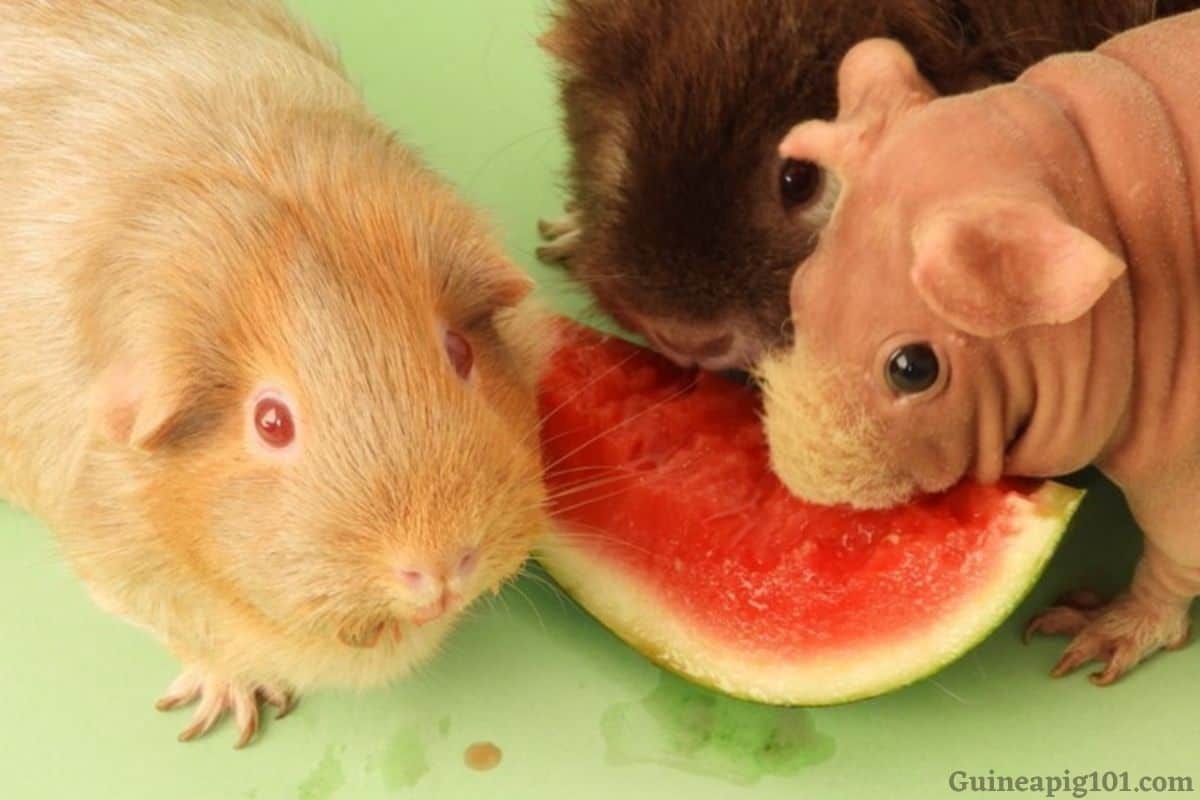
A small serving would be nothing exceeding a slice in general. If you want to measure it, you can consider just a little more than a tablespoon or two would be the right quantity.
But do remember every guinea pig is different. Some like to enjoy the flesh of watermelon while others nibble around its rind.
Please make sure to wash your watermelon adequately so that any chemicals present in the outer rind gets removed.
These chemicals are harmful to your guinea pigs. If possible serve them with organic watermelon only.
Do check out their stool after eating for any irregularity. If you find any ill effect then immediately stop serving the fruit or decrease the quantity.
Digestive diseases in guinea pigs are common and can be fatal if left unchecked.
Can guinea pigs have watermelon rind and how often?
Yes, Guinea pigs can eat watermelon rind for sure. Watermelon rind does contain a right amount of fiber which is tough for guinea pigs to digest so make sure you limit the quantity.
I would also recommend to shave off some part of the rind. The outer green part is tough to digest while the white inner part is quite okay for our guinea pigs. The best would be to serve only the fruit part with some white rind in it.
You can serve the rind to your guinea pigs whenever you serve the fruit but keep in a close watch for signs of diarrhea.
Can guinea pigs eat watermelon seeds?
No, We need to ensure that we remove all the seeds before serving watermelon to our guinea pig. The black seed of watermelon is especially harmful to guinea pigs.
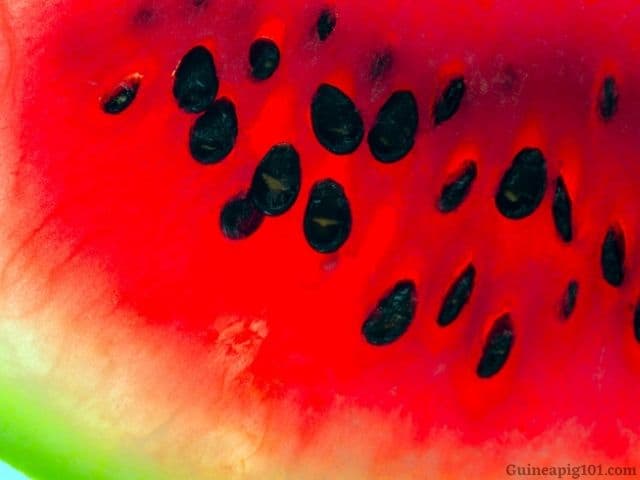
These seeds can cause choking and even death in some instances.
Although they can eat the soft white seeds, few of those are not that harmful but make sure you remove the rest.
You can provide them with other safe tree branches like apple, willow, birch, etc.
Can guinea pigs have watermelon juice?
No, We should not serve watermelon juice to our guinea pigs. The sugar content in the juice is on the higher side which often causes many diseases like obesity and diabetes in guinea pigs.
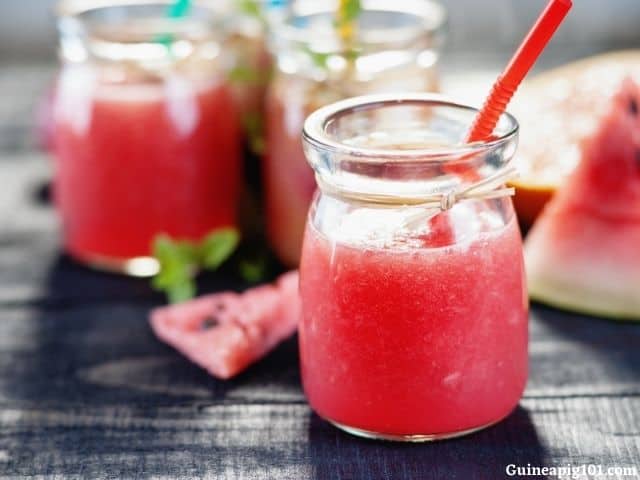
To wind up, I would say we can serve our guinea pigs with watermelon. They love to chew onto the flesh of it.
But be cautious about the quantity and try to help only organic one if possible.
Can guinea pigs eat watermelon seeds?
Guinea pigs can eat yellow watermelon but only in moderation.
Yellow watermelon has almost the same nutritional value as red watermelon. Thus, you can feed it to your guinea pigs as a refreshing snack.
How to prepare watermelon for serving?
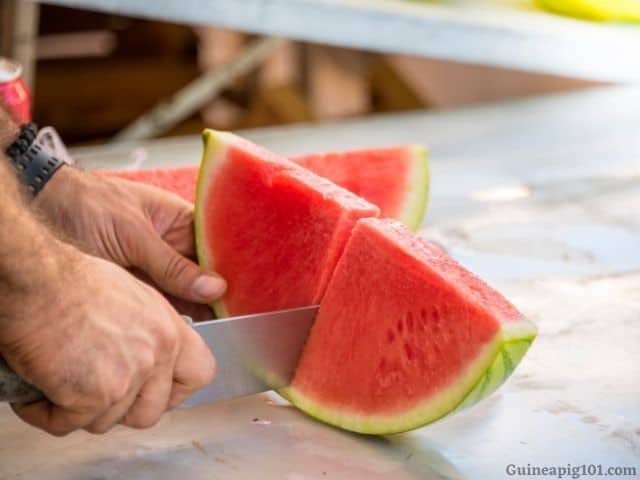
- The First step is to choose the right watermelon. Watermelon must be ripe. Avoid the unripe ones as they are not fit for your guinea pigs. A ripe melon contains 90% water in contrary to their counterparts.
- The second step will be to wash the outer rind properly to ensure no chemicals are present in it. Preferable to choose an organic one.
- The third step is to slice the watermelon properly. Watermelon must be given at the suggested quantity only. If we get too generous, then we might end up with a bad health situation for our pigs.
- Finally, we must serve the white portion of the rind and the red flesh to the guinea pigs. Remember to clear out any uneaten part within a few hours of helping to avoid unnecessary bacteria buildup.
Conclusion
- Watermelons are a great source of vitamin and minerals for the body. It also keeps the body hydrated in the scorching summer heat.
- Can guinea pigs eat watermelon? Yes, guinea pigs can eat watermelon. They are a great source of lots of vitamins as well as water in the scorching summer heat.
- Guinea pigs can get Vitamin C, Vitamin A, Calcium, Potassium and lots of other minerals from watermelon. These minerals are essential for the healthy growth of guinea pigs.
- However, we must moderate the quantity of serving. If guinea pigs are served watermelon in excess, then they might suffer from diarrhea and diabetes which is fatal for them.
- Guinea pigs can eat watermelon frequently if the quantity is moderate. Usually, 2-3 times a week should not be harmful to our guinea pigs.
- The standard serving size for watermelon shall be a slice of small size. However, this shall depend upon the age of your guinea pigs.
- We can serve the watermelon with its rind to our guinea pigs. Although some guinea pigs like to have melon with skin the others doesn’t. It shall depend upon your guinea pigs.
- Remember to remove all the seeds from the watermelon before serving it. Watermelon seeds can lead to choking hazard in guinea pigs.
- Also, avoid frozen watermelon as it can lead to diarrhea. However, you can thaw it and serve it later once it is in room temperature.
- Watermelon juices should be avoided entirely though as they are high in sugar and can lead to various health diseases in guinea pigs.
Upto You Now
I hope that this article was helpful to you guys in finding out your answers. If you guys liked the article and found it useful, Do share it with your friends and family. Sharing it won’t cost you anything, but it will surely make my day. Thanks!
Similar Posts:
- Can Guinea Pigs Eat Kiwi? (Serving Size, Risks & More)
- Can Guinea Pigs Eat Grapes? (Serving Size, Hazards & More)
- Can Guinea Pigs Eat Strawberries? (Serving Size, Benefits, Risks & More)
- Can Guinea Pigs Eat Cantaloupe? (Hazards, Serving size & More)
- Can Guinea Pigs Eat Tomatoes? (Serving Size, Benefits, Risks & More)